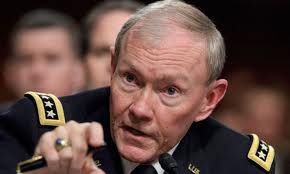
The United States and Britain yesterday urged Israel not to attack Iran’s nuclear program as the White House’s national security adviser arrived in the region, reflecting growing international jitters that the Israelis are poised to strike.
In their warnings, both the chairman of the US Joint Chiefs of Staff, General Martin Dempsey, and British Foreign Secretary William Hague said an Israeli attack on Iran would have grave consequences for the entire region and urged Israel to give international sanctions against Tehran more time to work.
Dempsey said an Israeli attack is not prudent, and Hague said it would not be “a wise thing.’’ It was not known whether their messages were coordinated.
Both Israel and the West believe Iran is trying to develop a nuclear bomb, but differences have emerged in how to respond to the perceived threat.
The US and the European Union have imposed harsh new sanctions targeting Iran’s oil sector, the lifeline of the Iranian economy. With the sanctions just beginning to bite, they have expressed optimism that Iran can be persuaded to curb its nuclear ambitions.
Israel has the capability to strike Iran and delay the Iranians ‘probably for a couple of years. But some of the targets are probably beyond their reach.’
Quote Icon
Iran’s Oil Ministry yesterday said it has halted oil shipments to Britain and France in an apparent preemptive blow against the European Union’s embargo against Iranian oil, which is set to begin in July.
Both Britain and France moved last year to curtail oil purchases from Tehran to less than 3 percent of their daily needs, but Spain, Italy, and Greece are among Europe’s biggest buyers of Iranian oil.
The semiofficial Mehr news agency said the National Iranian Oil Co. has sent letters to some European refineries with an ultimatum to either sign long-term contracts of two to five years or be cut off. The 27-nation EU accounts for about 18 percent of Iran’s oil exports.
United Nations investigators will begin two days of meetings in Iran today, offering Tehran’s government a chance to avert a possible military conflict.
Officials from the International Atomic Energy Agency flew to Tehran for their second round of talks in a month. The visit begins a week after President Mahmoud Ahmadinejad said his country will boost production of 20-percent enriched uranium at a mountainside location in Fordo.
White House national security adviser Tom Donilon arrived in Israel for the latest in a series of high-level meetings between Israel and the United States. Last month, Dempsey visited Israel, and next month, Prime Minister Benjamin Netanyahu is expected to visit the White House. Donilon was set to meet with Netanyahu late yesterday, and with Israeli Defense Minister Ehud Barak today before leaving.
In an interview broadcast on CNN yesterday, Dempsey said Israel has the capability to strike Iran and delay the Iranians “probably for a couple of years. But some of the targets are probably beyond their reach.’’
He expressed concern that an Israeli attack could spark reprisals against US targets in the Persian Gulf or Afghanistan, where American forces are based. “That’s the question with which we all wrestle. And the reason that we think that it’s not prudent at this point to decide to attack Iran,’’ Dempsey said.
Describing Iran as a “rational actor,’’ Dempsey said he believed international sanctions on the country are beginning to have an effect.
Israeli officials have welcomed the sanctions. But they have pointedly refused to rule out military action and in recent weeks sent signals that their patience is running thin.
Israel believes a nuclear-armed Iran would be a threat to its very existence, citing Iran’s support for Arab militant groups, its sophisticated arsenal of missiles capable of reaching Israel, and its leaders’ calls for the destruction of the Jewish state.
Last week, Israel accused Iran of being behind a string of attempted attacks on Israeli diplomats in India, Georgia, and Thailand.
There is precedent for Israeli action. In 1981, the Israeli air force destroyed an unfinished Iraqi nuclear reactor. And in 2007, Israeli warplanes are believed to have destroyed a suspected unfinished nuclear reactor in Syria.
Analysts, however, have questioned how much an Israeli operation would accomplish. With Iran’s nuclear installations scattered and buried deep underground, it is believed that an Iranian strike would set back but not destroy Iran’s nuclear program. There are also concerns Iran could fire missiles at Israel, get its local proxies Hezbollah and Hamas to launch rockets into the Jewish state, and cause global oil prices to soar ]by striking targets in the Gulf.
In a sign that the diplomatic pressure might be working, Iran’s foreign minister said yesterday that a new round of talks with six world powers on the nuclear program will be held in Istanbul. Ali Akbar Salehi did not give any timing for the talks.
The last round of talks between Iran and the five permanent members of the UN Security Council plus Germany, held in January 2011, ended in failure.
Asked whether he believed Israel could be deterred, Dempsey said: “I’m confident that they understand our concerns, that a strike at this time would be destabilizing and wouldn’t achieve their long-term objectives. But, I mean, I also understand that Israel has national interests that are unique to them.’’
The Boston Globe

Leave a Reply
You must be logged in to post a comment.